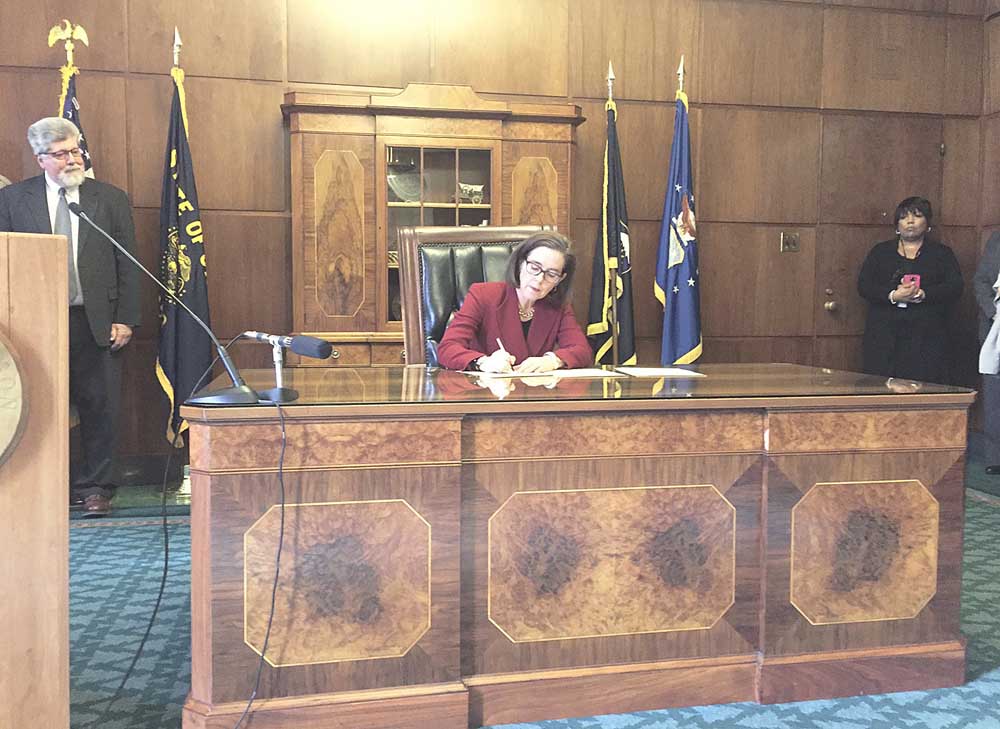Brown reverses course on Portland highway veto
Published 8:00 am Wednesday, August 16, 2017

- Gov. Kate Brown has changed her mind on vetoing funding for a Portland highway, but decided to reject several other bills.
SALEM — Gov. Kate Brown on Tuesday reversed course on vetoing $2 million in funding for long-awaited safety upgrades on Capitol Highway in Southwest Portland.
An announcement Aug. 9 that the governor would scuttle the Capitol Highway appropriation with a veto spawned outcry from the state’s congressional delegation, bicycle activists and local officials. Brown had said she intended to veto the highway safety project because the appropriation came from lottery proceeds, rather than transportation revenue from the statewide gas tax.
“In the past week, I’ve received significant input from a wide range of constituencies since providing the veto notice,” Brown wrote in a letter, explaining her decision. “It’s clear that the City of Portland Southwest Capitol Highway Safety Improvements project is a good project and should be funded. In the interest of all who have worked so hard on this project, I will not veto this item.”
The $10 million project would widen and add sidewalks and bike paths to a dangerous section of the highway between Garden Home and Taylors Ferry roads. Portland has dedicated $3.3 million to the project from the temporary 10-cent a gallon gas tax approved by city voters at the May 2016 election. The rest of the money will come from transportation system development charges.
Sen. Ginny Burdick, D-Portland, who represents part of the area where the project is located, thanked the governor for reversing her decision.
The project “will make a huge difference for the people living in those communities who choose to walk and bike for transportation,” Burdick said. “Without sidewalks and paths, that area is not safe for them. This project will improve walkability and bicycling opportunities, and quite possibly save lives.”
The project’s completion hinges on state’s investment of $2 million, said Oregon Congressman Earl Blumenauer, D-Portland.
“This project was carefully vetted and considered on its own merits by both chambers of the legislature,” said Blumenauer, a former City Council member who was in charge of the Portland Bureau of Transportation.
The council, Southwest Portland community leaders and others also urged Brown to not veto the state funding.
The money was part of House Bill 5006, this session’s so-called Christmas tree bill, which includes funds for projects in lawmakers’ individual districts.
Brown also spared $1 million in state funding for Medford’s Holly Theatre from the veto’s blade. However, she executed her veto of two other Medford projects, $1.9 million for Bradshaw Drop Irrigation and $750,000 for Harry and David Baseball Park. All three projects also were part of House Bill 5006.
Rep. Sal Esquivel, R-Medford, had agreed to vote for a bill to levy health care provider taxes in exchange for the Southern Oregon projects, Brown said. After passage of the tax bill, he signed onto an initiative to repeal parts of the legislation.
“The representative broke this straightforward agreement, and in the interest of being able to negotiate support for future legislation that all sides honor I must hold him accountable,” Brown wrote.
The governor also vetoed House Bill 3355 and Senate Bill 689 Tuesday, Aug. 15.
House Bill 3355 would have allowed psychologists to write mental health prescriptions for patients. Proposed by Oregon City Rep. Bill Kennemer, a clinical psychologist, the bill was intended to enhance patients’ access to mental health care. Yet, it drew opposition from the Oregon Medical Association, Oregon Psychiatric Physicians Association, the Oregon Council of Child & Adolescent Psychiatry and the American Psychiatric Association.
“While I laud efforts to improve access, I have several concerns with the bill … particularly related to patient safety and ensuring appropriate prescribing, which prevent me from approving it,” Brown wrote.
Brown vetoed Senate Bill 689, which would have continued the Task Force on Reentry, Employment and Housing, which studies ways to help offenders rejoin the community after a period of incarceration.
The governor said she supports the work of the task force but that it duplicates efforts by the governor-appointed Reentry Council. In fact, the two bodies had some of the same membership.
“I cannot in the interest of efficiency support the continuation of two bodies doing similar work,” she said.
#








